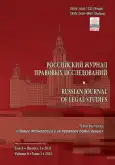Historical and Political Analysis of the Decentralization Process in Italy
- Authors: Dudaeva M.V.1
-
Affiliations:
- Institute of Legislation and Comparative Law under the Government of the Russian Federation
- Issue: Vol 8, No 1 (2021)
- Pages: 65-74
- Section: Political and Legal Doctrines
- Submitted: 01.04.2021
- Accepted: 01.04.2021
- Published: 27.05.2021
- URL: https://journals.eco-vector.com/2410-7522/article/view/64467
- DOI: https://doi.org/10.17816/RJLS64467
- ID: 64467
Cite item
Abstract
The author of the article examines the peculiarities of the Italian political space through a retrospective analysis of that country’s longstanding decentralization process. As a starting point, the author takes the end of the Risorgimento era, during which the national liberation movement of the Italian people united against foreign domination of their fragmented nation. A periodization of the decentralization process is given, indicating its main milestones: 1) the establishment of the Kingdom of Italy (1815 to 1871); 2) the Fascist regime (1922 to 1943); 3) adoption of the Italian Constitution and the Statutes of the Special Regions (1947); 4) regional reform (1970) and; 5) constitutional reform (2001). The key criteria for assessing the degree of decentralization in Italy are considered, including whether the regions have the right to adopt their own laws, initiate legislation at the central level, and participate in international activities. The author concludes that the Italian political elite has succeeded in decentralizing the republic and building a new regional policy based on the principles of subsidiarity. The reforms of the political and legal institutional design were mainly related to the delineation of the spheres of competence between the state and the regions, the consolidation of autonomous status for all regions, the abolition of the government commissioner, and the challenge of regional legislation exclusively by the Constitutional Court, creating the basis for the quasi-federal features of the Italian political and legal system. Thus, it is natural to say that Italy belongs to a special “transit” form of state structure of the regionalist type, located at the juncture between unitarianism and federalism.
Keywords
Full Text
About the authors
Marina V. Dudaeva
Institute of Legislation and Comparative Law under the Government of the Russian Federation
Author for correspondence.
Email: dudaevamarina@yandex.ru
ORCID iD: 0000-0002-1962-4468
SPIN-code: 3515-0967
PhD student, junior researcher
Russian Federation, MoscowReferences
- Baldini G, Baldi B. Decentralization in Italy and the Troubles of Federalization. Regional and Federal Studies. 2014;23(1):87–108.
- Sardaryan GT. Political Problems of Regionalization of Italy: a monograph. Moscow: MGIMO-University, 2016. 150 p. (In Russ.)
- Lomonaco F. Rapporto al Cittadino Carnot. Napoli, 1861. 288 p.
- Bertie J. Democrats and Socialists in the Period of the Risorgimento / translated from the Italian by VS Bondarchuk, TS Zlochevskaya, ed. by KF Misiano. Moscow: Progress, 1965. 664 p. (In Russ.)
- Palermo F, Wilson A. The Dynamics of Decentralization in Italy: Towards a Federal Solution? European Diversity and Autonomy Papers. 2013;4:25.
- Ziblatt D. Structuring the State: The Formation of Italy and Germany and the Puzzle of Federalism. Princeton University Press, 2008. 238 p.
- Sardaryan GT. Political Problems of Relations Between Regions and the Central Government in Italy: dissertation ... candidate of Political Science: 23.00.02. Moscow, 2015. 161 p. (In Russ.)
- Gooch J. The Unification of Italy. Lancaster pamhlettes. 2002. 58 p.
- Yakubov LA, Kislenko AO. Reasons and Prerequisites of Risorgimento in Italy of the XIX century. The reports at the 17-th Regional Student Scientific Conference of Nizhnevartovsk State University. 2015. P. 182–185. (In Russ.)
- Mazzini G. Manifesto della Giovine Italia. In: Mazzini G. Scritti editi e inedita. 1861;1:122–130.
- Mikhailenko VI. Italian Fascism 90 Years Later: the Relevance of the Historical Phenomenon. Forum. 2013;1(112): 6–17. (In Russ.)
- Kholodkovsky KG. The Changing Political Image of Italy. Italy at the Beginning of the XXI century. Collection of articles on the results of the conference. Moscow: IMEMO RAS. 2015. 152 p. (In Russ.)
- Nikitina VM. Local Self-Government in the System of Public Power and Public Administration in Italy: dissertation ... candidate of Legal Science: 12.00.02. Moscow, 2018. 220 p. (In Russ.)
- Dergachev VA. New Forms of International Economic Regionalization. Economic innovation. 2014;57:111–126. (In Russ.)
- Hine D. Federalism, Regionalism, and the Unitary State: Contemporary Regional Pressures in Historical Perspective. Italian Regionalism: History, Identity & Politics. Washington D.C.: Berg. 1996. P. 109–131.
- Vasilyeva TA. Regional Autonomy in Italy: Legal Aspects: dissertation ... candidate of Legal Science: 12.00.02. Moscow, 1983. 181 p. (In Russ.)
- Bin R. Veri e Falsi Problem del Federalismo in Italia. Ed. by Luigi Mariucci. Il Federalismo Preso sul Serio. Il Mulino. Bologna. 1996. P. 61–78.
- Baldini G, Salvatore V. The Regions in Search of a New Institutional Identity / ed. by Caciagli Mario and Zuckerman Alan S. Italian Politics: A Review. Berghahn. Oxford. 2001. P. 85–101.
- Bull M, Pasquino G. A Long Quest in Vain: Institutional Reforms in Italy. West European Politics. 2007;30(4):670–691.
- Barabanov ON. Trends in the Development of Regional Policy in Italy. Vestnik MGIMO. 2012;1:61–67. (In Russ.)
- Sardaryan GT. The Constitutional Reform of 2001 in Italy in the Context of the Transition from a Complex Unitary State to a Federal One. Law and Management of the XXI century. 2013;2(27):122–129. (In Russ.)
- Gestri M. La Riforma del Titolo V della Costituzione e il Potere Estero Delle Regioni. Bologna: Il Mulino, 2003. 110 p.
- Bogatyreva ON. Regions of Italy in Modern International Activity: Legal Aspect. Proceedings of the Ural Federal University. Ser. 2: Humanities. 2012;4(108):82–96. (In Russ.)
- Maslova EA. Matteo Renzi's Constitutional Reform: the Essence and Possible Consequences. Law and Management of the XXI century. 2017;2:61–66. (In Russ.)
Supplementary files







